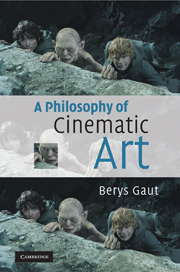3 - Cinematic authorship
Published online by Cambridge University Press: 01 March 2010
Summary
This book is about cinematic art. If there is an art form, there must, it seems, be artists working in that art form. If that is so, what can we learn about cinematic art by studying the cinematic artist, the so-called ‘cinematic author’? This chapter investigates that question, arguing that cinematic authors play a role in the understanding and evaluation of films and that all traditional films made by more than one person in the key production roles are multiply authored. I then argue that the multiple-authorship thesis also applies to digital cinema, and that the latter medium enhances possibilities for collaboration between different film artists. Finally, I show how multiple authorship is also true of interactive digital cinema, but argue that the audience are not among the authors of interactive works, though they do count as co-authors of interactive works' instances.
TWO PUZZLES
The notion that certain films are authored is one of the most powerful and pervasive views in current thinking about cinema. The enthusiast who looks forward to the film she thinks of as the new ‘Scorsese’, ‘Allen’, ‘Rohmer’, or ‘Tarantino’ is paying homage to the idea of the director-as-author. Rooted in the writings of Truffaut and other French critics in the 1950s, the view was transplanted to the United States by Andrew Sarris in the early 1960s, and dubbed by him ‘the auteur theory’.
- Type
- Chapter
- Information
- A Philosophy of Cinematic Art , pp. 98 - 151Publisher: Cambridge University PressPrint publication year: 2010



